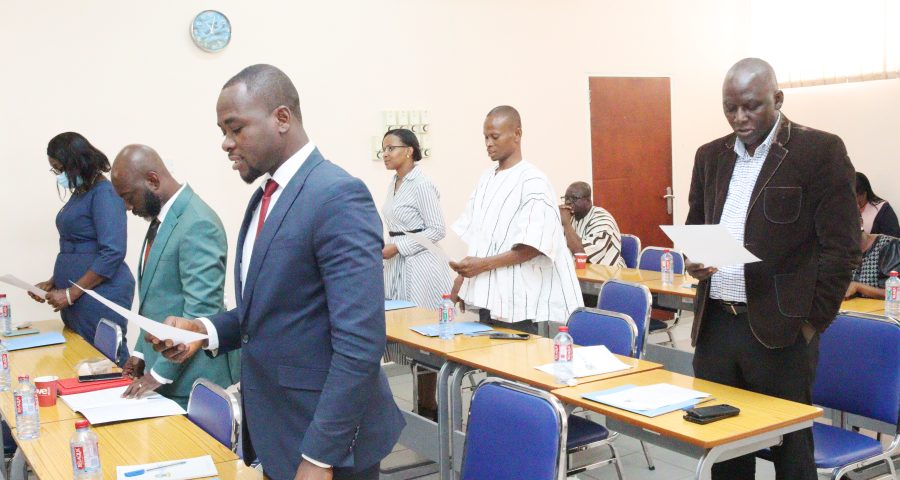May 2022: Fifteen students who are also the fourth batch of the Doctor of Philosophy in International Conflict Management (PICM) Programme were matriculated into the Kofi Annan International Peacekeeping Training Centre (KAIPTC) on Thursday, 5th May 2022.
The number of students enrolled is the highest number recorded since the Centre commenced its postgraduate programmes in 2011. The matriculants comprised diplomats, senior officers in the security services, staff of CSOs/NGOs, as well as fresh graduates seeking to specialise and build a career in the issue-areas of conflict, peace and security.
The KAIPTC is the first training Centre in Africa to deliver post-graduate academic programmes in Conflict, Peace and Security. The Centre has an outstanding international reputation recognised by the UN, AU, ECOWAS, and other international organisations, and its academic programmes have been duly accredited.
The Centre has reputable alumni from several countries working in Security and Intelligence Institutions/Agencies, International and Regional Organisations, Civil/Public Servants, Members of Parliaments/Government, the Judiciary, Members from the Diplomatic Corps and Civil Society/Non-Governmental Organizations in Ghana, Africa and beyond.
Addressing the fresh students, Major General Francis Ofori, Commandant of KAIPTC, said the aim of the PhD programme is to among others, equip students with the skills and competencies in teaching and research and to achieve the highest professional standards in the area of Conflict Prevention and Management.
He said the programme is designed to equip students with specialised knowledge and skills to play meaningful roles in managing conflicts and provide professional leadership in multi-dimensional peace support operations in International and Regional Organizations, such as UN, AU, ECOWAS, Civil Society Organizations as well as Non-Governmental Organisations.
He said since the inception of the Centre’s postgraduate programmes in 2011, it has remained highly committed to the vision of building a world-class institution of higher learning that projects KAIPTC as the leading provider of tertiary education and training in African peace and security.
“The programme’s potential and capacity to attract a wide array of students from different disciplines is worthy of note,” he said.
Maj Gen Ofori urged the students to eschew mediocrity and strive for excellence through hard work, determination and strike the balance between their academic work and other competing priorities.
He also encouraged them to reflect on how Africa could consolidate democracy on the continent in the wake of the recent wave of military takeovers in the sub-region.
“Your role in contributing your quota to the development of your nation and Africa is critically needed,” he told the students.
Speaking on behalf of his cohort, Brig Gen William Agyepong, Director-General in charge of Defence Industries Department at General Headquarters, Burma Camp, expressed gratitude to the Centre for admission onto the programme. He pledged their co-operation and adherence to the regulations and requirements of the programme. On their expectations from the faculty and the Centre, he noted that the quality and high standards that has been the hallmark of KAIPTC as a Centre of Excellence be sustained and reflected in the teaching, learning and overall student experience.
Over 800 students have so far graduated from KAIPTC’s postgraduate programmes, which aside the PhD programme, include one-year Master’s programmes in conflict, gender, peace and security. These are structured flexibly into regular, weekend and executive variants to meet the needs of students.
The KAIPTC was established as an institution of the Ghana Armed Forces in 1998 and commissioned in 2004 by the Government of Ghana. As an international ECOWAS mandated Training Centre of Excellence, the KAIPTC’s main mission is to provide globally recognised capacity for international actors in the African Peace and Security landscape through training, education and research to foster peace and stability on the continent.


